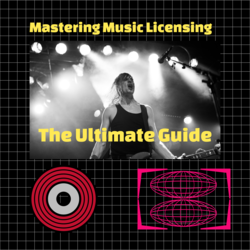Mastering Music Licensing: The Ultimate Guide 2023
Music licensing is a critical aspect of the music industry that often goes overlooked by artists, musicians, and producers. This guide will provide a comprehensive overview of the basics of music licensing and how to ensure your music is properly licensed. Whether you're a seasoned professional or just starting out in the music industry, mastering music licensing is essential to protecting your rights and ensuring that your music is legally used.
Understanding the Basics of Music Licensing
Music licensing is the process of obtaining permission to use a piece of music in a specific context. This can include using music in a film, television show, video game, commercial, or any other type of media. When music is licensed, the owner of the copyright to the music grants permission to the user to use the music for a specified period of time and for a specified purpose. Music licensing is a complex and often confusing process, but it's essential to understand the basics in order to protect your rights as a musician or producer. The first step in mastering music licensing is understanding the different types of licenses that exist.
Sync Licenses
A sync license is the most common type of music license. It allows the user to sync music with visual content, such as a film, television show, or commercial. Sync licenses are typically granted for a specified period of time and for a specific purpose.
Mechanical Licenses
A mechanical license is required when a song is recorded and distributed as a physical product, such as a CD or vinyl record. The owner of the copyright to the song must grant permission for the recording to be made and distributed.
Performance Licenses
A performance license is required when music is performed live, such as in a concert or on the radio. Performance licenses ensure that the musicians and composers who created the music are properly compensated for their work.
Protecting Your Rights with Music Licensing
Music licensing is essential to protecting your rights as a musician or producer. When you license your music, you ensure that your work is properly compensated and that you have control over how your music is used. It also helps to prevent unauthorized use of your music, which can have serious legal consequences. To protect your rights, it's essential to understand the basics of music licensing and to always obtain the necessary licenses before using or distributing your music. You should also keep detailed records of all licenses granted and ensure that all licensing agreements are properly documented.
Navigating the Music Licensing Process
The music licensing process can be complex and confusing, but it's essential to understand the basics in order to ensure that your music is properly licensed. The first step in mastering music licensing is to educate yourself on the different types of licenses that exist and the requirements for obtaining each type of license. Next, you should identify the specific type of license that you need based on how you plan to use your music. For example, if you plan to use your music in a film, you'll need a sync license. If you plan to record and distribute your music as a physical product, you'll need a mechanical license. Once you've identified the type of license you need, the next step is to secure the necessary licenses. This may involve negotiating the terms of the license, such as the length of time the license is granted for and the specific purposes for which the music can be used.
Conclusion
Music licensing is a critical aspect of the music industry that often goes overlooked by artists, musicians, and producers. However, mastering music licensing is essential to protecting your rights and ensuring that your music is legally used.
Whether you need royalty free stock music, original music or post audio services, The Cueniverse can take care of all of your audio needs. We collaborate with the most talented musicians in the world to bring you the best music for your content.

Comments ()